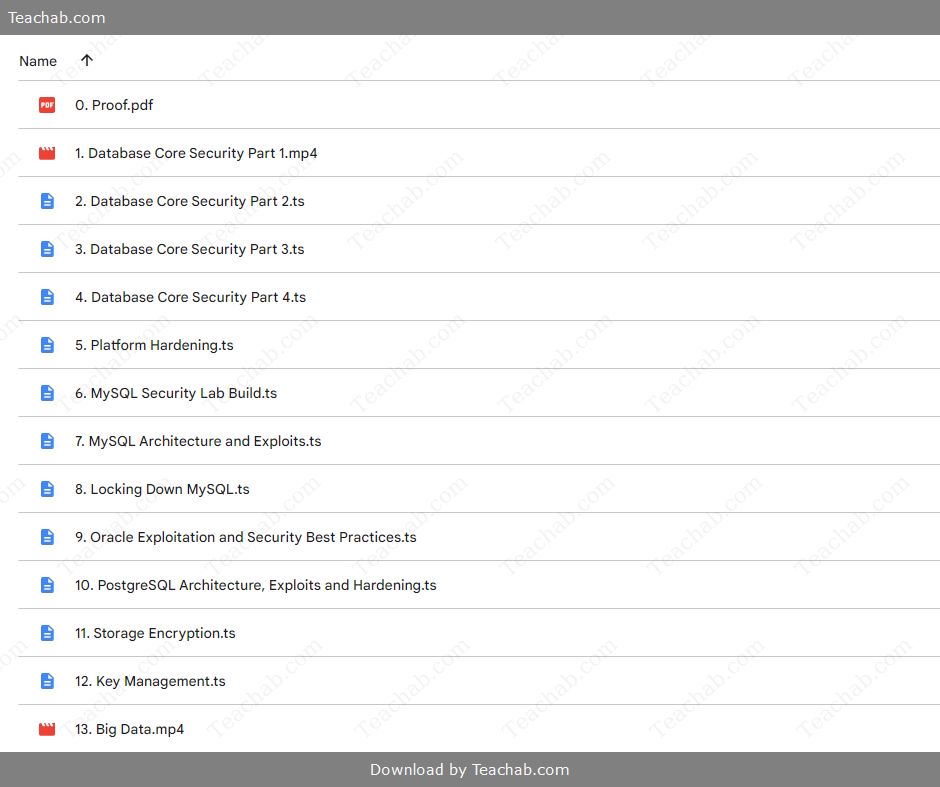Database Security for Cyber Professionals By Stone River eLearning
$99,00 $6,00
Database Security for Cyber Professionals – Immediate Download!
Let’s embark on a captivating adventure to uncover remarkable insights that spark your curiosity and elevate your understanding

Database Security for Cyber Professionals By Stone River eLearning
Overview

Database Security for Cyber Professionals
In today’s digital landscape, the security of databases is paramount, as these repositories hold critical data integral to businesses and organizations. Cyber professionals operate in an ever-evolving environment filled with threats that grow more sophisticated by the day. With companies increasingly relying on data-driven decision-making, understanding how to protect sensitive information stored in databases has become a crucial skill set in cybersecurity. This comprehensive guide will explore the intricacies of database security, catering to those eager to sharpen their expertise in safeguarding both open-source and commercial database environments.
The “Database Security for Cyber Professionals” course offered by Stone River eLearning provides an insightful roadmap for navigating the complexities of database protection. It delves into key principles, practical strategies, and advanced techniques necessary for defending against modern threats. Designed to address the intricacies of various platforms and attack vectors, this course equips individuals with the knowledge needed to prevent unauthorized access and breaches, ensuring that databases remain fortified against adversaries. Join us as we unravel the components of this effective course aimed at developing robust defensive capabilities in the realm of database security.
Course Overview
The “Database Security for Cyber Professionals” course is an essential program tailored to empower learners with the skills required to safeguard database platforms from the multifaceted threats present in today’s cyber landscape. Think of database security as a fortress needing constant reinforcement; the course offers both theoretical frameworks and practical applications, akin to training a skilled knight to protect the castle from invaders. Encompassing a variety of topics, it emphasizes not only the understanding of database vulnerabilities but also hands-on experience in combating them.
Participants will engage in conceptual lectures coupled with practical screencasts to explore database security intricacies. This dual approach provides them with a robust understanding of fundamental concepts while allowing them to conduct test attacks and, in turn, implement effective security measures. By mimicking how threats exploit weaknesses, learners gain insights useful for fortifying their own systems. Through this blend of knowledge and experience, the course shapes keen professionals adept at navigating the ever-changing landscape of database security.
Summary Table of Course Features
| Course Feature | Description |
| **Target Audience** | Cybersecurity professionals, IT staff, database administrators |
| **Learning Model** | Combination of lectures and practical screencasts |
| **Duration** | Approximately 3 hours |
| **Primary Skills Developed** | Database security principles, risk assessment, implementation of measures |
| **Practical Application** | Real-world lab exercises and test cases |
Learning Objectives
The “Database Security for Cyber Professionals” course aims to equip learners with the knowledge and skills necessary to tackle database security challenges effectively. By the end of the program, attendees will leave with a treasure trove of competencies that every cyber professional should possess. Imagine being armed with an array of tools to navigate an impenetrable forest; the skills acquired in this course will guide them through the challenges they might face in the wild world of cyber threats.
Key Learning Goals:
- Understand Core Database Security Principles: Participants will delve into foundational knowledge, including the basic principles that form the backbone of database security. A firm grasp of these concepts enables professionals to construct strong defenses against potential attacks.
- Conduct Security Evaluations: Armed with the capability to identify vulnerabilities, participants will learn to perform rigorous security evaluations encompassing auditing and penetration testing. It’s akin to a detective searching for clues to prevent future crime.
- Implement Security Measures: Participants will gain practical skills in applying security measures effectively this includes everything from configuring access controls to encrypting sensitive data, akin to building strong walls to protect the castle.
- Explore Specific Database Systems: The course provides an in-depth exploration of popular database management systems, including MySQL, PostgreSQL, and Oracle. By understanding these systems’ architectures and common exploits, learners can better defend against tailored attacks.
- Design Secure Database Environments: The course teaches participants to architect secure databases from the ground up, ensuring security best practices to mitigate risks are embedded within the design.
- Engagement with Laboratory Exercises: Through hands-on labs focused on exploiting vulnerabilities and implementing security solutions, fighters gain necessary practical experience to face real-world adversaries confidently.
Learning Outcomes
Upon completion, learners will be armed with market-relevant skills, enhancing their standing in the job market and giving them a competitive edge. By understanding both the offensive and defensive aspects of database security, participants will emerge as adept cyber warriors equipped to protect their organizations from a myriad of threats.
Target Audience
The “Database Security for Cyber Professionals” course is designed with a broad audience in mind, catering to individuals keen on enhancing their skills in database security. Picture a diverse gathering beginners curious about the nuances of data protection, seasoned IT professionals eager to sharpen their edge, and database administrators dedicated to ensuring their systems remain uncompromised.
Key Audience Segments:
- Cybersecurity Professionals: Individuals already in the cybersecurity field looking to enrich their understanding of database vulnerabilities and protective measures.
- IT Staff and System Administrators: Those responsible for managing database environments can significantly benefit from learning best practices and mitigation strategies.
- Database Administrators: Professionals tasked with the responsibility of overseeing database security, ensuring compliance, and maintaining data integrity will find ample value in the training offered by this course.
- Tech Enthusiasts and Beginners: Newcomers who wish to dive into the exciting domain of cybersecurity can leverage this course to build foundational knowledge in database security.
By grasping the essence of database security, participants can craft robust defenses and create a safer digital environment for their organizations an attractive proposition for anyone involved in handling data.
Course Duration
The “Database Security for Cyber Professionals” course offers a concise yet comprehensive exploration of database security over a structured timeframe of approximately three hours. This duration is akin to a focused training camp, where individuals emerge significantly more formidable in their abilities.
The course is meticulously divided into multiple modules, each designed to cover critical topics related to database security. The combination of conceptual lectures and hands-on screencasts ensures that participants receive a balanced education like a well-prepared athlete honing both their mental and physical skills.
Participants can expect a well-organized structure that guides them through essential topics, ensuring that they do not feel overwhelmed by the breadth of information. The inclusion of practical exercises promotes retention and application of knowledge, making the entire learning experience more effective.
| Course Duration Details | Duration |
| **Total Time** | Approximately 3 hours |
| **Number of Modules** | 13 modules covering diverse aspects of database security |
| **Learning Format** | Conceptual lectures and practical screencasts |
This focused timeline allows both professionals and beginners alike to integrate learning efficiently into their schedules while maximizing the impact of their educational experience.
Course Content
The “Database Security for Cyber Professionals” course encapsulates a rich tapestry of foundational and advanced concepts vital to securing both open-source and commercial database platforms against modern threats. With modular content, learners have the opportunity to engage in various critical areas while being guided through essential practices and practical applications.
Core Content Breakdown:
- Database Core Security:
- Part 1: Essential database security concepts for beginners.
- Part 2: Advanced techniques for effectively securing databases.
- Parts 3-4: Implementation of security protocols and best practices.
- Platform Hardening:
- Key strategies for fortifying database environments against potential breaches.
- MySQL Security:
- A thorough investigation into MySQL’s architecture, vulnerabilities, and hands-on lab sessions that emphasize securing database instances.
- Oracle and PostgreSQL Security:
- In-depth focus on identifying vulnerabilities specific to Oracle databases and implementing best practices for PostgreSQL security.
- Data Encryption Practices:
- Techniques for protecting sensitive data at rest and proper key management strategies.
- Big Data Security Considerations:
- Address challenges faced in securing big data environments, emphasizing tailored approaches for these vast repositories of information.
By marrying theoretical knowledge with practical applications, the course provides an all-encompassing education that prepares participants for the dynamic field of database security, ensuring they emerge with a nuanced understanding of modern protection mechanisms against varying threats.
Database Security Fundamentals
At the core of the “Database Security for Cyber Professionals” course lies an emphasis on database security fundamentals. Think of these principles as the bedrock upon which a sturdy fortress is built without a solid foundation, the structure is susceptible to collapse.
Understanding the essence of database security is essential for any professional aiming to safeguard sensitive data from nefarious individuals. The principles cover multiple vital aspects, including access control, data integrity, and the importance of encryption.
Access control, a primary tenet of database security, serves as the gatekeeper; it determines who can access specific data within the database. This is crucial not only for regulatory compliance but also for protecting sensitive information from unauthorized access. The principle of least privilege underscores this necessity, emphasizing that users should only be granted access to the data necessary for their roles.
Data integrity further contributes to the reliability of a database, ensuring that the information remains unchanged and remains accurate over time. Implementing validation checks and database constraints assists in maintaining data integrity, shielding systems from corruption and manipulation.
Security Protocols and Best Practices
- Regular Audits: Conduct routine audits to gauge compliance and security effectiveness.
- Data Encryption: Implement encryption protocols at both rest and in transit, securing data against interception.
- Backup Solutions: Regularly back up data to counteract loss from breaches or system failures.
- Cross-Training: Foster an environment of awareness where staff members understand their role in maintaining data security.
By deeply engaging with these fundamentals, participants acquire a solid grounding necessary for more advanced topics within the course equipping them to tackle modern database security challenges effectively.
Open Source Database Security
Open-source databases are favored for their flexibility, scalability, and cost-effectiveness. However, they also introduce unique security challenges and considerations that cyber professionals must navigate. The “Database Security for Cyber Professionals” course dives into both open-source and commercial realms, equipping learners with the knowledge to secure popular platforms like MySQL and PostgreSQL effectively.
When examining open-source databases, it’s important to note that being open-source does not equate to being less secure; rather, it implies a community-driven approach to development. This community can act as both a strength and a potential point of vulnerability. Open-source databases benefit from community scrutiny, which can lead to the rapid identification and remediation of vulnerabilities. However, the reliance on community engagement means that not all vulnerabilities may be immediately addressed, exposing systems to risk.
Key Open Source Platforms Discussed:
- MySQL Security:
- Understand the architecture and common exploits associated with MySQL.
- Engage in practical lab exercises focused on strengthening MySQL instances, including user permissions and specific configurations to lock down vulnerabilities.
- PostgreSQL Security:
- Delve into vulnerabilities unique to PostgreSQL and implement secure configurations to harden the database.
- Common Security Practices:
- Regular updates and patches are essential for keeping open-source databases secure.
- Consistent monitoring of database activity can prevent unauthorized access and data breaches.
Cyber professionals will gain invaluable insights into effectively managing the security of open-source databases, fostering an understanding of both the benefits and challenges associated with securing these platforms.
Commercial Database Security
In contrast to open-source databases, commercial database platforms like Oracle and Microsoft SQL Server come with their own set of security features, tools, and challenges that necessitate specialized knowledge. The course examines these critical differences, helping learners navigate commercial landscape nuances effectively.
Commercial database systems often provide robust security frameworks and features that organizations can leverage for enhanced protection. However, the customizability and complexity of these systems can introduce vulnerabilities if not appropriately managed. It is vital for cybersecurity professionals to understand inherent risks and mitigation strategies.
Focus Areas in Commercial Database Security:
- Oracle Database Security:
- Discuss key vulnerabilities associated with Oracle databases and industry best practices for mitigation.
- Explore user roles, permissions, and how to effectively secure data through integrated security features.
- SQL Server Security:
- Identify SQL Server-specific vulnerabilities and the security measures that can be implemented for maximum protection.
- Focus on user authentication, auditing, and encryption mechanisms afforded by commercial platforms.
- Security Configuration:
- Learn essential steps for ensuring adequate configuration of commercial databases to prevent common attack vectors.
- Understand how to apply patches and updates critical for maintaining a fortified database environment.
The comparative insights provided during the course enable participants to transition smoothly between open-source and commercial contexts, equipping them with versatile skills applicable to diverse scenarios in database security.
Modern Threats to Database Security
Database security does not exist in a vacuum; it must confront an ever-evolving landscape of modern threats. Cybercriminals continually develop new tactics and techniques to exploit weaknesses in database systems, underscoring the necessity for cyber professionals to stay apprised of contemporary threat vectors.
Key Modern Threats:
- SQL Injection Attacks:
- One of the most prevalent forms of database attack, SQL injection involves inserting malicious SQL queries into input fields. This can grant attackers unauthorized access or allow them to manipulate sensitive information within the database.
- Ransomware:
- Ransomware continues to pose a significant threat to businesses worldwide. Attackers encrypt data and threaten to release sensitive information unless a ransom is paid, making strong database backup strategies essential.
- Insider Threats:
- Insider threats can arise from staff members with legitimate access seeking either to exploit their position or act out due to malicious intent. It’s imperative to implement stringent access controls and monitoring protocols to mitigate these risks.
- Misconfigured Databases:
- Improper configuration is a major vulnerability in database security. Default settings might linger, allowing unauthorized users access to sensitive data. Regular reviews and adjustments of configurations can stave off potential breaches.
By effectively analyzing these modern threats, course participants gain insight into implementing protections tailored to their unique environments. This proactive approach positions them to devise strategic countermeasures capable of defending against a myriad of attack vectors.
Attack Vectors in Database Security
Understanding different attack vectors that target database systems is crucial for effective cybersecurity. Each vector brings unique challenges and requires specific strategies to mitigate associated risks. The course addresses these vectors by representing them as paths that attackers may take to breach defenses insights that professionals must recognize and confront head-on.
Common Attack Vectors:
- Brute Force Attacks:
- Attackers systematically attempt to access databases using numerous password combinations. Implementing robust authentication protocols with account lockout features can significantly reduce such attempts’ effectiveness.
- Malware:
- Rogue software may infiltrate systems through various means, posing significant risks to database integrity. Continuous monitoring and employing robust anti-malware solutions are critical in protecting database environments.
- Cross-Site Scripting (XSS):
- Attackers can exploit web applications to execute scripts in the user’s browser, often leading to data theft or manipulation. Strengthening input validation and sanitizing output can help mitigate this threat.
- Denial of Service (DoS):
- DoS attacks aim to overwhelm databases with excessive requests, rendering them inoperable. Implementing rate limiting and traffic analysis can thwart these attacks.
By bridging the knowledge gap between emerging attack vectors and defensive strategies, participants develop key insights for real-time application in their respective roles. Awareness of these vectors promotes proactive planning and strategic security implementations to create robust database environments.
Security Best Practices
Equipping oneself with knowledge is only part of the battle; implementing effective security best practices is the pathway toward resilient database security. Throughout the course, participants will explore key practices that not only bolster security but also foster an organizational culture centered around cybersecurity.
Essential Security Practices:
- Regular Security Audits:
- Conducting thorough audits routinely ensures ongoing compliance with security protocols and standards while revealing potential weaknesses.
- Data Encryption:
- Encrypting sensitive data at rest and in transit acts as a formidable barrier against adversaries looking to exploit databases.
- Comprehensive User Training:
- Developing a culture of security awareness among staff fosters an environment where everyone plays a role in maintaining security.
- Incident Response Planning:
- Preparing for potential breaches through well-defined incident response plans enables organizations to react swiftly and effectively, mitigating damage caused by breaches.
- Segmentation and Isolation:
- Maintaining a segmented approach reduces the risk of exposing comprehensive data in case of an attack, enabling targeted responses instead of widespread vulnerabilities.
By fostering a multi-faceted approach to database security, cyber professionals ensure organizational resilience against a plethora of threats, ultimately contributing to a secure and efficient operational environment.
Tools and Techniques
To effectively manage database security, professionals must equip themselves with the right tools and techniques. Throughout the “Database Security for Cyber Professionals” course, key tools and methodologies are discussed, enabling participants to implement effective security measures tailored to their environments.
Key Tools Emphasized:
- Vulnerability Scanners:
- Tools such as Nessus and Qualys automate vulnerability assessments across databases, surfacing weaknesses that require immediate attention.
- Encryption Tools:
- Solutions supporting strong encryption practices, such as IBM Guardium, ensure that sensitive information is kept secure while in transit or at rest.
- Database Activity Monitoring:
- Implementing DAM solutions allows organizations to track database activity in real-time, identifying unusual behavior indicative of potential breaches.
- Security Information and Event Management (SIEM):
- SIEM tools collect and analyze security events, providing a comprehensive view of the organization’s security posture and highlighting opportunities for improvement.
- Backup Solutions:
- Regularly backing up data with robust solutions ensures recovery in the face of ransomware or other forms of data loss.
By understanding and leveraging these tools, participants can ensure a strong security posture to safeguard sensitive data contained within databases.
Security Assessment Tools
Security assessments are integral to identifying and mitigating vulnerabilities in database systems. The “Database Security for Cyber Professionals” course underscores the importance of employing effective assessment tools to maintain robust defenses.
Essential Assessment Tools:
- Nessus:
- A widely used vulnerability scanner that automates the detection of vulnerabilities in a variety of systems, including databases, providing actionable reports for remediation.
- OpenVAS:
- An open-source alternative that conducts comprehensive vulnerability assessments across databases and other technical system environments.
- Burp Suite:
- A popular toolkit for web application security testing that includes features designed to identify SQL injection vulnerabilities and more.
- SQLmap:
- A specialized tool for automating the process of detecting and exploiting SQL injection vulnerabilities in databases, particularly valuable for penetration testers.
- IBM Guardium:
- A solution specifically tailored for database monitoring and auditing, ensuring compliance and real-time threat detection.
With a focus on using these tools effectively, cyber professionals will propel their security assessments and develop comprehensive security strategies tailored to their organization’s needs.
Penetration Testing Methodologies
Understanding penetration testing methodologies is crucial for developing a holistic approach to database security. The course underscores various established strategies, enabling participants to recognize and leverage them effectively in protecting their environments.
Essential Penetration Testing Phases:
- Pre-Engagement Activities:
- This initial phase involves gathering information about the target environment, defining the scope, and obtaining necessary authorizations.
- Engagement Phase:
- The execution of the actual testing, where techniques from frameworks such as the OWASP Testing Guide help guide activities aimed at exploiting vulnerabilities.
- Post-Engagement Activities:
- Following testing, this phase emphasizes documenting findings, presenting actionable insights, and providing recommendations for remediation to enhance security posture.
- Reporting and Remediation:
- Providing detailed reports summarizing vulnerabilities discovered during testing and suggesting strategies to remediate them, contributing to a cyclical improvement of security measures.
By following these methodologies, participants can not only understand flaws within their infrastructure but can also advocate for better practices to protect vital database environments effectively.
Vulnerability Management
Vulnerability management is a critical aspect of maintaining strong database security. The course elucidates the steps necessary for managing vulnerabilities, ensuring organizations can proactively identify and mitigate risks.
Key Phases of Vulnerability Management:
- Discovery:
- Use automated tools to regularly scan databases and identify existing vulnerabilities.
- Assessment:
- Prioritize vulnerabilities based on potential risk and impact assessed through qualitative and quantitative measures.
- Remediation:
- Determine the best approach for addressing the vulnerabilities identified, whether through patches, configuration changes, or other methods.
- Verification:
- Conduct follow-up assessments to ensure vulnerabilities are effectively mitigated.
- Refinement:
- Continuously improve vulnerability management practices based on lessons learned and evolving security landscapes.
By maintaining a robust cycle of vulnerability management, organizations can better secure their databases from emerging threats and ensure long-term data protection.
Case Studies
Through examining real-world case studies, the “Database Security for Cyber Professionals” course provides valuable insights into effective practices and necessary precautions.
Highlighted Case Studies:
- Equifax Data Breach (2017):
- Following a security lapse that left sensitive data exposed for months, organizations learned the importance of timely updates and comprehensive vulnerability assessments.
- Capital One Breach (2019):
- An example of misconfigured access controls leading to extensive data exposure, emphasizing rigorous security configurations and regular reviews.
- Target Data Breach (2013):
- A sprawling investigation revealed gaps in supply chain security and the necessity for third-party risk management insights critical for database administrators.
By analyzing these incidents, participants can learn practical lessons regarding vulnerabilities and their implications, enabling them to adopt more effective practices in their security management.
Real-World Database Breaches
Understanding real-world database breaches enriches learners’ knowledge, as they explore the multifaceted effects of such incidents on organizations and customers. The course emphasizes the narratives behind data breaches, urging participants to incorporate lessons into robust security measures.
Notable Breaches:
- MongoDB Ransomware:
- Attackers targeted unsecured MongoDB databases, illustrating the critical need for proper configurations and security protocols.
- Yahoo Data Breach:
- A massive breach involving stolen account information affected billions, underscoring the importance of user data protection and compliance standards.
Lessons Learned:
- Regular updates and timely patching can prevent potential breaches from exposed vulnerabilities.
- Continuous vulnerability assessments and proactive security measures are necessary to safeguard databases against emerging threats.
By understanding the narratives behind breaches, participants gain context and a stronger resolve to implement potentially life-saving security measures.
Course Certificate
Upon successful completion of the “Database Security for Cyber Professionals” course, participants will receive a certificate that underscores their new expertise in this critical area of cybersecurity. Certification acts as more than a document; it is a tangible representation of the knowledge and skills acquired throughout the training.
Importance of Certification:
- Industry Recognition: Having a recognized certification signals to employers that the individual possesses the knowledge to tackle database security challenges effectively.
- Career Advancement: As the demand for cybersecurity professionals continues to rise, certification can significantly enhance one’s employability, making candidates more desirable to employers in this competitive job market.
By obtaining this certification, learners amplify their value within the cybersecurity realm, positioning themselves as competent professionals adept at facing database security challenges head-on.
Importance of Certification
The importance of certification cannot be overstated in the rapidly evolving field of cybersecurity. Obtaining a certificate in database security signifies a commitment to professional growth and mastery over essential concepts and practices.
Why Certification Matters:
- Enhanced Employability:
- In a competitive job market, possessing relevant certifications increases the likelihood of securing interviews and job offers.
- Trust and Credibility:
- Certification enhances trust with clients and employers, as they can be assured that certified professionals understand key security concepts and technologies.
- Skill Recognition:
- Certification validates technical skills, demonstrating that an individual has undergone rigorous training and is well-equipped to handle specific technologies or security concerns.
- Continued Professional Development:
- Many certification programs necessitate ongoing education and training, encouraging individuals to stay current with the latest trends and practices in cybersecurity.
Pursuing certification is a forward-thinking move, offering both immediate benefits in terms of job opportunities and long-term advantages for career progression.
Career Opportunities
The relentless demand for cybersecurity professionals translates to diverse career opportunities for those skilled in database security. As organizations increasingly recognize the value of safeguarding their data, career prospects in this field continue to flourish.
Potential Career Paths:
- Database Administrator:
- Responsible for implementing security measures, managing database systems, and ensuring data integrity.
- Security Analyst:
- Specializes in identifying vulnerabilities and cyber threats against database systems, often conducting security audits and assessments.
- Penetration Tester:
- Focuses on actively testing database security through simulated attacks, providing organizations with insights into their vulnerabilities.
- Compliance Officer:
- Ensures that organizations comply with legal and regulatory requirements regarding data protection and establish necessary controls.
- Data Security Consultant:
- Provides expert advice to organizations attempting to reinforce their database security, often implementing tailored strategies.
The opportunities in this realm are expansive, and with the increasing importance of data security, individuals may find themselves positioned at the forefront of innovative security advancements.
Student Feedback
Students enrolled in the “Database Security for Cyber Professionals” course have shared feedback reflecting their experiences with the material and the instructor’s methodologies. Feedback serves as a lens, allowing future participants to gauge the value and effectiveness of the course.
Student Insights:
- Positive Learning Experience: Many students noted the blend of theoretical knowledge with hands-on exercises, emphasizing that it allowed them to learn and apply concepts effectively.
- Engaging Content: Students appreciated the course’s structure, finding it accessible regardless of their prior knowledge in cybersecurity.
- Skill Enhancement: A number of contributors reported improved confidence and technical skills surrounding database security practices post-completion.
- Flexible Learning: The option to access course materials at any time had met varying schedules, allowing individuals to learn at their own pace.
This feedback highlights the importance of both the course design and content, evidencing that participants leave equipped with invaluable skills relevant to their professional journeys in cybersecurity.
Reviews and Ratings
While specific ratings for the “Database Security for Cyber Professionals” course might not be prominently displayed, it is essential to consider broader metrics indicative of quality education. Stone River eLearning boasts an impressive reach, with over 1,200,000 students enrolling in their technology courses an indicator of engagement and successful learning outcomes.
Overall Course Satisfaction:
- Commitment to continual improvement is demonstrated through a 30-day money-back guarantee, emphasizing confidence in quality and student satisfaction.
- Engaging curriculum coupled with practical assignments reinforces positive learning experiences, encouraging students to further their careers in cybersecurity.
Success Stories
The culmination of knowledge, hard work, and relevant training often leads to success stories, inspiring future learners about the transformative power of education within database security. Prominent examples of individuals whose careers have been enriched by this course highlight the potential for meaningful career development.
Notable Success Stories:
- Career Advancement:
- Students have reported transitioning into senior security roles, gaining recognition for their expertise in database protection, thanks to the knowledge acquired from the course.
- Obtaining High-Paying Positions:
- Some learners attribute salary increases to their knowledge in database security principles gained during the course, reinforcing the course’s value to their professional growth.
- Industry-Recognized Certifications:
- Numerous participants have successfully obtained industry-standard certifications based on the course material, enhancing their employability credentials further.
- Positive Impact on Organizations:
- Alumni of the course have been able to implement best practices learned during training, directly influencing their organizations’ security postures positively.
The success stories shared by past participants serve as a powerful testament to the course’s ability to equip individuals with relevant skills and knowledge critical for advancing careers in the cybersecurity landscape.
The “Database Security for Cyber Professionals” course stands as a crucial milestone in one’s journey through the expansive and challenging field of cybersecurity. Through it, learners can carve pathways toward professional excellence and a more secure digital future.
Frequently Asked Questions:
Innovation in Business Models: We use a group purchase approach that enables users to split expenses and get discounted access to well-liked courses. Despite worries regarding distribution strategies from content creators, this strategy helps people with low incomes.
Legal Aspects to Take into Account: Our operations’ legality entails several intricate considerations. There are no explicit resale restrictions mentioned at the time of purchase, even though we do not have the course developers’ express consent to redistribute their content. This uncertainty gives us the chance to offer reasonably priced instructional materials.
Quality Control: We make certain that every course resource we buy is the exact same as what the authors themselves provide. It’s crucial to realize, nevertheless, that we are not authorized suppliers. Therefore, the following are not included in our offerings: – Live coaching sessions or calls with the course author.
– Entry to groups or portals that are only available to authors.
– Participation in closed forums.
– Straightforward email assistance from the writer or their group.
Our goal is to lower the barrier to education by providing these courses on our own, without the official channels’ premium services. We value your comprehension of our distinct methodology.
Be the first to review “Database Security for Cyber Professionals By Stone River eLearning” Cancel reply
You must be logged in to post a review.


















Reviews
There are no reviews yet.